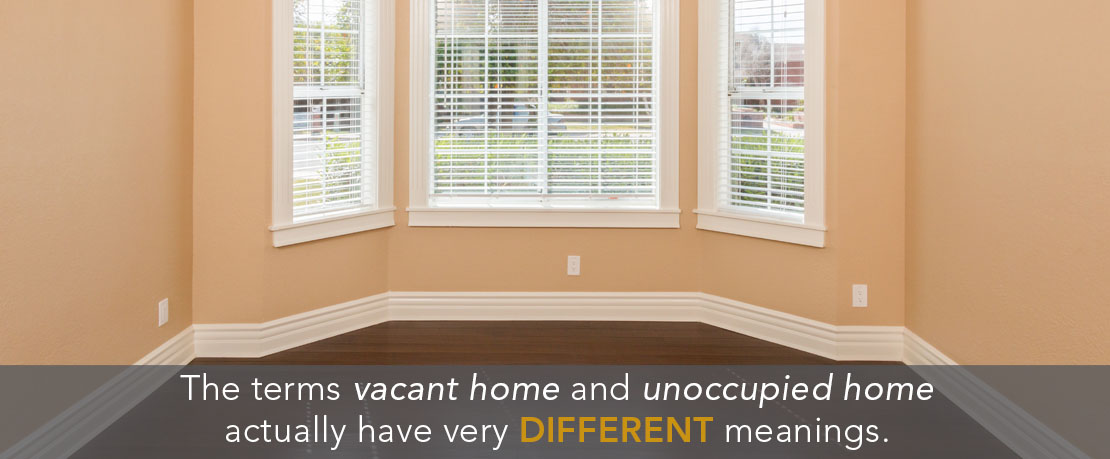
By Luke Brown
Home Insurance | No, we’re not talking about the classic 1990 movie, Home Alone. We’re talking about leaving your home alone, voluntarily or involuntarily.
First, let’s define some terms. You might think that the terms vacant home and unoccupied home are synonymous. In fact, even courts have confused the terms and considered them as meaning the same thing. But in reality, and for insurance purposes, they have very different meanings.
The differing meanings of vacant and unoccupied go to the very core of the insurance coverage that protects you:
- In homeowners insurance language, a vacant home is one that is not just un-lived in, but that has nothing at all in it. That includes people, furniture, or appliances—it is entirely empty.
- In contrast, an unoccupied home is one in which no one currently lives. In other words, it is not now lived in despite there being physical objects that would make it possible for someone to live in it—furniture and appliances, for example.
It’s important that homeowners understand the distinct meanings of the terms. The importance lies in the fact that different homeowners insurance policy forms cover distinct risks or categories of risks. A policy form is the written contract that specifies what the insurance company is responsible for. It also defines the insured’s responsibilities to the insurance company, such as paying premiums and timely reporting of occurrences that may give rise to claims.
What Difference Does It Make?
The difference is based upon the language of the policy that is in force when an otherwise covered loss occurs. Some policies exclude coverage when the house is vacant, and others may have a broader exclusion. The latter policies eliminate coverage when a house is vacant, unoccupied, or uninhabited. That is a broader exclusion because there may not be coverage if either condition exists: vacancy or unoccupied.
What It Can Mean to You
Let’s imagine you are fortunate enough to go on an around-the-world cruise that will last for two months. You choose not to have a house-sitter, so during your journey, no one is staying in your home. Most homeowners insurance policies contain limitations on how long a home can be unoccupied before insurance coverage limitations apply.
Why? When you think about it, the answer is fairly clear. If the house is occupied (people living in it) and, for example, a water pipe bursts, chances are that damage can be minimized by a timely response: turning the water off at its source, having required repairs done, and doing whatever else might be needed to stem the tide (no pun intended). Even if the occupants are at work when the pipe bursts, it is a far different scenario than if they are away on a two-month cruise.
But don’t cancel those travel plans just yet. The good news is that American Integrity Insurance Company offers an endorsement that you can purchase to extend your homeowner’s insurance to allow for situations when the house will be unoccupied for longer than the time stated in the policy. Yes, there will be an additional premium for the endorsement, but it is far preferable than leaving your valuables uninsured.
For rental or non-owner occupied homes, American Integrity Insurance provides a dwelling property 3 (DP-3) policy that is made for these specific situations. Since the dwelling policy provides less coverage than a traditional homeowners insurance policy, it’s also much more cost-effective.
Similar considerations exist when a residence is vacant (empty of people and things): American Integrity also offers a vacant home policy, which is written on a dwelling property 1 (DP-1) policy form. A vacant home policy may be needed when an owner is trying to sell or rent a home, for example.
For more information about American Integrity’s home insurance products and to find the best coverage for you, contact us today.